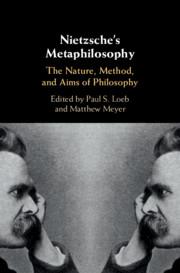Book contents
- Nietzsche’s Metaphilosophy
- Nietzsche’s Metaphilosophy
- Copyright page
- Contents
- Contributors
- Acknowledgments
- Note on Texts, Translations, and References
- Abbreviations
- Introduction
- Part I Evolving Metaphilosophies
- Part II The Nature of Philosophy
- Part III The Method of Philosophy
- Chapter 7 Nietzsche’s Affective Perspectivism as a Philosophical Methodology
- Chapter 8 Nietzsche’s Philosophical Naturalism
- Chapter 9 Nietzsche’s Moral Methodology
- Part IV The Aims of Philosophy
- Bibliography
- Index
Chapter 8 - Nietzsche’s Philosophical Naturalism
from Part III - The Method of Philosophy
Published online by Cambridge University Press: 24 October 2019
- Nietzsche’s Metaphilosophy
- Nietzsche’s Metaphilosophy
- Copyright page
- Contents
- Contributors
- Acknowledgments
- Note on Texts, Translations, and References
- Abbreviations
- Introduction
- Part I Evolving Metaphilosophies
- Part II The Nature of Philosophy
- Part III The Method of Philosophy
- Chapter 7 Nietzsche’s Affective Perspectivism as a Philosophical Methodology
- Chapter 8 Nietzsche’s Philosophical Naturalism
- Chapter 9 Nietzsche’s Moral Methodology
- Part IV The Aims of Philosophy
- Bibliography
- Index
Summary
The overarching aim of philosophy, according to Nietzsche, should be to determine values and it is this task that differentiates philosophy from scientific inquiry (BGE 211). It has been argued in the secondary literature that Nietzsche’s emphasis on the creation of values commits him to a nonrevisionary account of the natural – mechanical – sciences and a demarcation of the sphere of values from that of naturalistic causes. This paper argues that to interpret Nietzsche in this way commits him to an intractable dualism that is also evident in some contemporary efforts, outside Nietzsche studies, to reconcile naturalism and normativity. Drawing on the resources of his will-to-power thesis, it is argued that Nietzsche provides an alternative and nondualist account of how values fit into nature. This view broadens what we mean by the natural beyond the narrow perspective of the natural sciences to include within it the human evaluative point of view. It is concluded that the creation of values, for Nietzsche, does not leave the natural sciences alone, but, rather, it inverts the current hierarchy between science and philosophy (BGE 204) by subjecting the Enlightenment view of nature to challenge.
Keywords
- Type
- Chapter
- Information
- Nietzsche's MetaphilosophyThe Nature, Method, and Aims of Philosophy, pp. 146 - 164Publisher: Cambridge University PressPrint publication year: 2019
- 1
- Cited by

